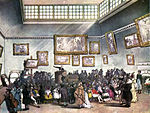
Back Auktionstheorie German Θεωρία δημοπρασιών Greek Teoría de subasta Spanish نظریه مزایده Persian Théorie des enchères French Teoria delle aste Italian 경매 이론 Korean Teoria aukcji Polish
Auction theory is an applied branch of economics which deals with how bidders act in auctions and researches how the features of auctions incentivise predictable outcomes. Auction theory is a tool used to inform the design of real-world auctions. Sellers use auction theory to raise higher revenues while allowing buyers to procure at a lower cost. The conference of the price between the buyer and seller is an economic equilibrium. Auction theorists design rules for auctions to address issues which can lead to market failure. The design of these rulesets encourages optimal bidding strategies among a variety of informational settings.[1] The 2020 Nobel Prize for Economics was awarded to Paul R. Milgrom and Robert B. Wilson “for improvements to auction theory and inventions of new auction formats.”[2]
- ^ The Committee for the Prize in Economic Sciences in Memory of Alfred Nobel (October 12, 2020). "Scientific Background on the Sveriges Riksbank Prize in Economic Sciences in Memory of Alfred Nobel 2020: Improvements to auction theory and inventions of new auction formats" (PDF) (Press release). Royal Swedish Academy of Sciences.
- ^ "The Prize in Economic Sciences 2020" (PDF) (Press release). Royal Swedish Academy of Sciences. October 13, 2020.
© MMXXIII Rich X Search. We shall prevail. All rights reserved. Rich X Search
